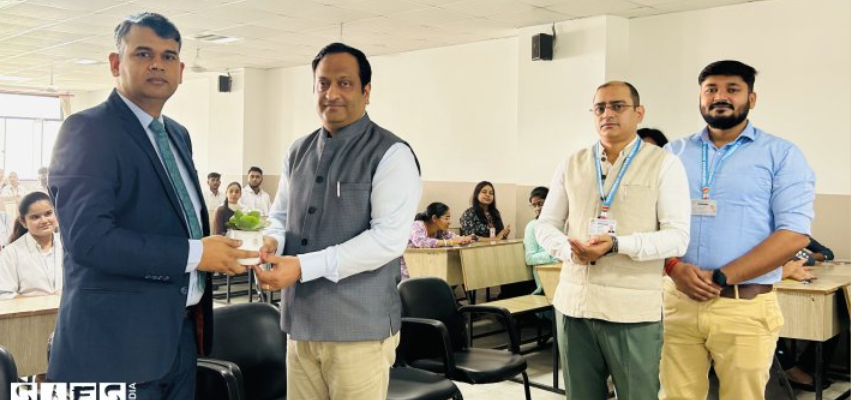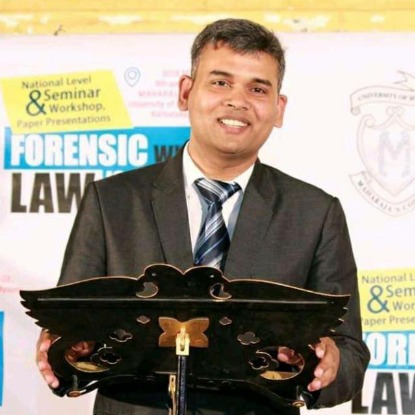
Bridging Theory and Practice: Forensic Sciences Experiential Learning
As an advocate for practical education in forensic sciences, I was delighted to address students and faculty at Teerthanker Mahaveer University, Moradabad. My lecture centered on an essential principle: hands-on experience is not just beneficial—it’s vital. While theoretical knowledge forms the foundation of forensic science, true expertise emerges when you combine that knowledge with real-world application.
Why Experiential Learning Matters in Forensic Sciences
In the intricate world of forensic science, precision is everything. Whether it’s analyzing a crime scene, examining physical evidence, or reconstructing events, the stakes are incredibly high. A misstep can lead to missed clues or, worse, a miscarriage of justice. This is why experiential learning is indispensable. It provides aspiring forensic professionals with the skills to perform accurate analyses and make informed decisions.
During the session, I highlighted how theory alone cannot fully prepare students for the complexities they will face in the field. Practical exposure helps them understand the nuances of crime scene investigation, from proper evidence handling to advanced analytical techniques. It also equips them with problem-solving skills essential for adapting to unpredictable scenarios.
Hands-On Activities: Learning by Doing
One of the highlights of my lecture was demonstrating the integration of theoretical insights with practical exercises. I emphasized that experiential learning goes beyond mere simulations; it involves engaging directly with tools, techniques, and methodologies used in real forensic investigations.
For instance, handling mock crime scenes teaches students how to document evidence meticulously, maintain chain-of-custody protocols, and employ scientific methods to analyze findings. These activities also foster teamwork, critical thinking, and the ability to perform under pressure—key traits of successful forensic experts.
The Role of Technology in Experiential Learning
Technology plays a significant role in enhancing hands-on forensic education. I shared examples of advanced tools such as 3D crime scene reconstruction software, digital forensic kits, and virtual reality crime scene simulations. These technologies not only enhance understanding but also allow students to practice scenarios that might be too complex or sensitive to replicate physically.
I encouraged the students to embrace these tools and use them to complement their hands-on training. By combining traditional techniques with cutting-edge innovations, they can stay ahead in this rapidly evolving field.
Real-Life Applications of Forensic Training
To illustrate the critical value of practical learning, I shared real-world cases where forensic skills played a pivotal role. From identifying latent fingerprints to decoding digital trails, these examples demonstrated how practical expertise can solve even the most challenging cases.
I also pointed out that experiential learning bridges the gap between classroom knowledge and field realities. For example, analyzing evidence in a controlled environment might seem straightforward, but doing so under the constraints of a real investigation demands a different level of precision and efficiency.
Inspiring the Next Generation of Forensic Experts
Interacting with the bright minds at Teerthanker Mahaveer University was incredibly rewarding. Their curiosity and enthusiasm reflected a genuine passion for the field. I urged them to seek out internships, workshops, and collaborative projects that offer practical exposure. I also stressed the importance of networking with professionals and participating in field research to gain a broader perspective.
A Vision for Forensic Education
I concluded the session by advocating for a more integrated approach to forensic education. Universities must prioritize experiential learning and create opportunities for students to practice what they learn. Initiatives like mock trials, internships with law enforcement agencies, and collaborations with forensic laboratories can prepare students to excel in the field.
Teerthanker Mahaveer University’s commitment to enhancing practical learning is commendable, and I am confident their students will become proficient forensic professionals. With a strong foundation in both theory and practice, they are well-equipped to uphold justice and contribute meaningfully to society.

